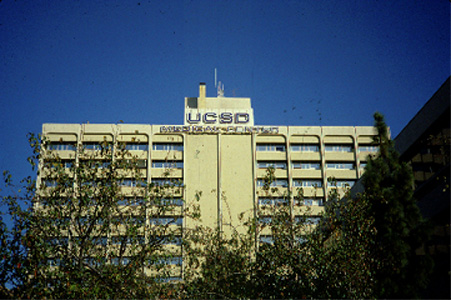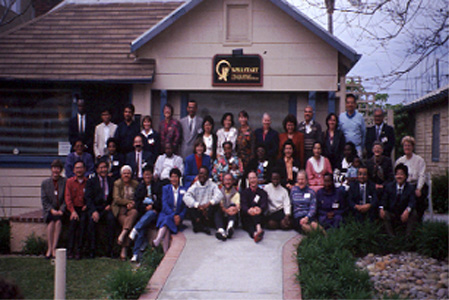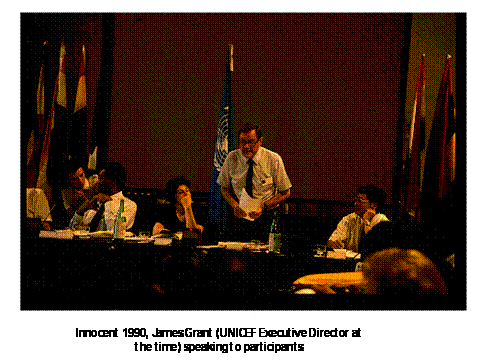|
First Steps to the Ten Steps and the
Baby Friendly Hospital Initiative
World changing ideas are often conceived at
unplanned times and in unexpected places. Such is the case with the Ten
Steps and the Baby Friendly Hospital Initiative. The first steps that
prepared the way for the Ten Steps and thus for the BFHI began unexpectedly
in 1980 at the University of California Medical Center in San Diego (UCSD).

UCSD Medical Center
1980
In 1980, the hospital had a policy of
"Modified Rooming-in" which meant that babies were with their
mothers except during visiting hours, when doctors made rounds and
at night ("mothers need their rest"). A UCSD pediatric faculty
member and a Pediatric Nurse Practitioner responsible for normal newborn
examinations and for teaching mothers, house officers and medical students
about normal newborn care, by chance, attended a series of seminars on the
science of lactation and the clinical management of breastfeeding*. The
seminar information made it clear that changes were needed at UCSD. Soon
after arrangements were made to summarize the seminar information in a
series on one hour in-service sessions for the maternity and nursery staff
as well as perinatal nutritionists, social workers, the midwifery teaching
staff, the pediatric faculty and the neonatologists. The sessions were
designed to assess the postpartum care that normal infants and their
mothers were receiving at the time and develop recommendations for changes
that would be more supportive of lactation physiology and newborn needs.
In 1981 the nursing staff drafted a new
policy that included true 24 hour rooming-in, no supplements without a
physician's order, unlimited nursing time at the breast, good positioning
techniques, regular evaluation of progress of both mother and baby during
the hospital stay (then usually 3 days), a follow-up visit soon after
discharge, a regular phone call from a member of the nursing staff in 24 to
36 hours after discharge, a written list of indicators of normal
breastfeeding progress for parents and a telephone number where the family
could reach a knowledgeable care provider seven days a week, 24 hours a
day.
In reality and as if often the case, the
changes in care procedures were already activated by the time the formal
policy was officially approved. All babies, regardless of whether or not
the mother had decided to breastfeed, were rooming-in with their mothers 24
hours per day. Nursing staff underwent cross training and were providing
family-centered nursing care with one nurse responsible for both mother and
baby. Formal evaluation of lactation and breastfeeding progress occurred
during every shift. In addition, a Lactation Clinic with a
multidisciplinary clinical team was launched. This "first of its
kind" service met once a week to provide early routine follow-up care
as well as treat problems that arose and of course teach medical and nurse
midwifery students as well as house officers from obstetrics, pediatrics
and family medicine.
In 1983, Wellstart International was created
as an independent nonprofit organization with a dual mission of educating
health care professionals and providing service to breastfeeding families.
With funding from the United States Agency for International Development
(USAID), Wellstart began providing several 4 week long courses in Lactation
Management Education each year for multidisciplinary teams of faculty and
Ministry of Health leaders from other countries. The 1981 UCSD policy was
used as an example of having mother/baby care policies which support the physiology
and needs of the newly delivered mother and her newborn infant. Guest
faculty were often invited to assist with the Wellstart courses and in
1987, Margaret Kyenkya, the UNICEF Senior Technical Advisor for Nutrition
spent a couple of days as a visiting faculty member. The idea of taking the
UCSD policy and developing a global model maternity and infant feeding
policy was informally discussed over lunch. Upon her return to UNICEF
headquarters in New York, Ms Kyenkya began discussions of the idea with
other UNICEF colleagues and international experts and with the Nutrition
Unit of the World Health Organization. The idea began to take hold. The
outcome of these discussions was the 1989 Joint WHO/UNICEF Publication
"Protecting, Promoting and Supporting Breastfeeding: The Special
Role of Maternity Services" in which reference to the Ten
Steps first appears.
Representatives of UNICEF, WHO, the Swedish
Development Agency (SIDA) and USAID began meeting as an interagency group
to map out a global strategy for breastfeeding promotion. This ultimately
led to the July 30 - August 1 1990 meeting in Florence Italy at a former
foundling home, Spedale degli Innocenti. From this three day meeting of
senior health officials representing 31 countries came the Innocenti
Declaration and in September 1990, the inclusion of breastfeeding in the
nutrition plan of the of the World Summit on Children held at the UN
Headquarters in New York.
Early in 1991, UNICEF, under the leadership
of James Grant the Executive Director, brought a number of organizations
and people together in New York City to discuss strategies for
operationalizing the Innocenti Declaration. Wellstart International was
invited to participate in these discussions. One of the several outcomes of
the meeting came from a small discussion group that focused on hospital
practices in which Dr. Audrey Naylor, the co-founder and representative of
Wellstart suggested that perhaps some kind of award could be developed for
hospitals that actually practiced the Ten Steps. Another outcome of the
meeting was the launching of an international grassroots breastfeeding
promotion organization, the World Alliance for Breastfeeding Action (WABA).
James Grant was enthusiastic about the ideas
and supported launching both outcomes and suggested that the award be
called the "Baby Friendly Hospital Award". He and his
senior staff went to work laying the ground work. They selected 12 starter
countries and worked with regional and country UNICEF offices that served
those countries as well as with Ministries of Health.
Wellstart suggested some ideas on what would
be needed in order to have a reasonable hospital assessment method that
would have international credibility. In June 1991, Margaret Kyenkya
arranged to meet in London with Dr. Audrey Naylor, the UCSD pediatric
faculty member and Dr. Felicity Savage-King, a well known physician with
vast international experience in breastfeeding promotion, to discuss
criteria that could be used in developing a global assessment
questionnaire. In the fall a few months later with support from UNICEF,
Wellstart developed a draft of an international assessment tool, designed
an 18 hour course that could be used by hospitals around the world to
fulfill the training requirement and planned a training seminar to prepare
the first team of master assessors/ trainers.
In February of 1992, a team of 37
professionals who were already knowledgeable about lactation management
arrived in San Diego from around the world to spend 10 days together
learning to use the new tools as well as train other to use them. Using a
train-the-trainers cascade approach, the 37 trainer/assessors returned to
their home countries and began launching the BFHI effort.

BFHI Master
Assessor/Trainers
The First Wave, February 1992
To further contribute to the global effort,
Wellstart also assisted WHO in developing a course for hospital
administrators (a bit shorter and with an emphasis on the economic benefits
to hospitals) as well as a monitoring and re-evaluation tool.
In 1996, with support from the US Committee
for UNICEF (now known as the US Fund for UNICEF), Wellstart also developed
the first� BFHI assessment tool and 18 hour course adapted for use in the
United States. Following the completion of a pilot test of the tools and designation
of the first US Baby Friendly Hospital (Evergreen in Kirkland Washington),
an independent nonprofit organization, Baby Friendly USA, was launched to
assume ongoing responsibility for assessing and designating hospitals in
the United States.
The Baby Friendly Hospital Initiative has
proven to be remarkably successful. By 2009 WHO and UNICEF reported that
there were over 20,000 hospitals in the world designated as Baby Friendly.
Some 86 of these are located in the United States with many more holding
certificates of intent to put the Ten Steps into effect for all mothers,
babies and families. Never would anyone working with mothers and babies at
UCSD in 1980 have imagined such an outcome. As Margaret Meade reminded us
many years ago,
"Never doubt
that a small group of thoughtful, committed people can change the world.
�Indeed, It is the
only thing that ever does".

*Taught in Los Angeles by Kittie Frantz, PNP
and Paul Fleiss, MD
**Preparation of the final documents and
training seminar had invaluable help from Helen Armstrong, Margaret Kyenkya
and Richard Reid from UNICEF and from Ann Brownlee, Mary Kroeger, Janine
Schooley, Veronica Valdes, and Ruth Wester as well as Carol Guenther,
Monica King and Pat Faucher from Wellstart International.
|